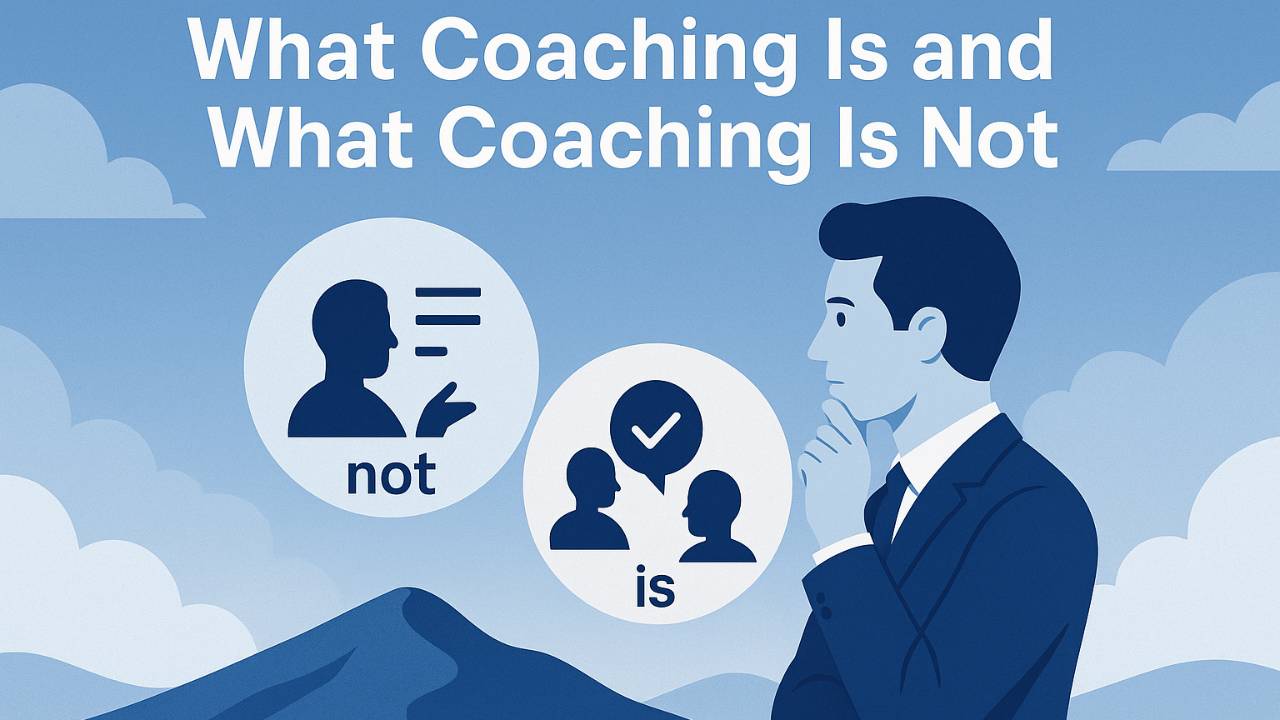What Coaching Is and What Coaching Is Not
May 12, 2025
Written by Pierre-Laurent (PILO) Verdon
There is a plethora of literature on coaching. That being said, the word “coach” is used in so many contexts that it makes it hard to understand what “coaching” is really all about. Want to know more? Follow the guide!

If we start first with a definition, the word has a number of meanings. The first meaning is a “bus” or “railway carriage” (British) and, by extension, “train” or “aircraft” (North American). I quite like that first definition as it really encapsulates the idea of “being on board, on the same journey together” — a great way to describe what coaching is about.

The other meaning is instructor, trainer, or tutor. This is where the confusion comes from! In all of these synonyms, there is an implication that the “coach” controls the outcome or the agenda. The trainer may come with a program that needs to be followed to reach an expected result (muscle mass, weight loss, or… world championship!). An instructor comes with a very clear set of instructions to follow. A tutor is a teacher and an authority in one’s field. The challenge with that definition is that it implies the coach talks and the coachee listens. This is the exact opposite of what professional coaching is about.

So, what is coaching? “Coaching is unlocking people's potential to maximize their own performance. It is helping them to learn rather than teaching them.” (John Whitmore). Coaching is about fostering curiosity, asking questions, mirroring, and focusing on the person. It relies on a very strong foundation: the coach believes the coachee is "naturally creative, resourceful, and whole" (Co-Active Training Institute). As the relationship grows, trust and confidence allow the coachee to generate actions and achieve associated results. Coaching is not advising, consulting, or mentoring. It is not about taking charge of someone’s problem and providing the solution. It is not focused on the task, analysis, or providing the best answer.

A really great way to start a coaching relationship is for the coach to ask: “What do you want from coaching?” or “What is your objective? Where do you think coaching could help?” The coach does not have an agenda — the coachee does. This first exploratory session may also be called a “chemistry session.” How does the coaching relationship feel to both parties? What will the coaching alliance involve? What are the expectations from the relationship?
So, what do coaches do? They learn to be fully present and totally in the moment. They learn to listen and ask really great questions within the context of a given relationship and in that specific moment. All of their techniques serve the coachee in the coaching relationship. They are not experts in a specific topic (sports, finance, leadership, teaching, time management, etc.). They are experts in coaching and require a significant amount of learning and practice to become proficient and certified (for example, by ICF: https://coachfederation.org). At times, they will challenge their coachees by holding their client’s agenda and mirroring what is happening — procrastination, avoidance, doubts — and at other times, they will champion their client’s progress, energy, creativity, and transformation. For coaching to work, there needs to be an equal investment of effort, work, and engagement from both parties for the relationship to succeed and deliver results.

Talking about results… how does it work for companies that need to achieve specific outcomes? It works exactly the same way. Indeed, the coaching scope can be defined at different levels — life, company, job, leadership, performance… It does not matter, as all aspects of one’s life are often connected. Personally, I quite like to start with a business or leadership objective and see coaching unfold addressing both personal and professional aspects of someone’s life. Results can be achieved in someone’s life by focusing on the being rather than the doing… and, magically, actions become much more impactful when well aligned with someone’s true self. As a leader for 20 years, I have often relied on coaching to improve individual and team performance, and I have seen both employees and companies benefit from being strongly aligned. This involves asking open questions, truly listening, and trusting employees’ resources to deliver results… following their own path.
Can coaching be applied anywhere? The answer is yes, as long as the coachee wants to be coached. That is the only condition required. Trying to coach someone who does not want to be coached does not work. Coaching can address any situation and does not need to be specialized. It can also help in friendships, with family, and at work.
Have you ever been fully trusted? Have you been fully listened to? Have you been encouraged and championed? How did it feel? How did that relationship help you grow? This is where coaching is magic. It trusts the coachee has the resources and creativity to find their own answers. When people find their own answers, they fulfill themselves, they thrive. They don’t need to be convinced or sold to. They know their course of action. This is where coaching is truly magic.
What about you? What has been your experience of professional coaching? Feel free to share comments and feedback.

